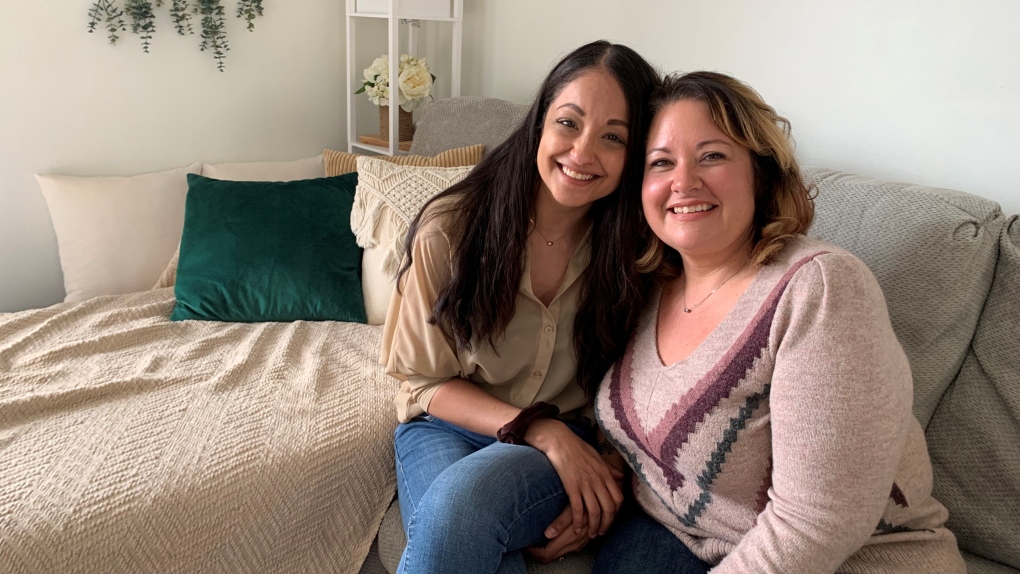'She saved me': Eastern Ontario woman receives kidney from future sister-in-law
April is Be A Donor Month, and two Eastern Ontario future sisters-in-law are sharing their story about organ donation in the hopes that it inspires others to consider giving.
Reading to her two-year-old son Leo, a simple precious moment for many parents, is something that could have never happened for Sarah Albert, without a kidney donation from her future sister-in-law Tera Harvey.
"I’m so grateful for what she’s done. Because she saved me, in a lot of ways," Albert says.
In 2020, at three months pregnant, Albert was rushed to Kingston General Hospital from her home in Belleville, after experiencing unusual symptoms like swelling and blindness.
Albert would eventually be diagnosed with atypical hemolyrtic-uremic syndrome (aHUS). It is a blood disorder so rare that only one in one million people get it.
"I had a gene and once I got pregnant, this gene woke up," she explains.
After she gave birth, doctors told Albert her kidneys were failing and went on dialysis. In need of a kidney, Albert needed to look outside the family to find a donor, because of the genetic component of the disease.
That’s when her future sister-in-law stepped up to see if she was a match.
"It wasn’t even a hesitation," explains Harvey. "It was the easiest decision I’ve ever made."
After a year of testing, Albert was told Harvey was an official match and last September the two went under the knife for the life-saving surgery.
“Every day (after surgery) you would see her come alive,” explains Harvey. “And that is when the emotions hit me.”
 Sarah Albert (left) and Tera Harvey seven months after kidney donation surgery. (Kimberley Johnson/CTV News Ottawa)
Sarah Albert (left) and Tera Harvey seven months after kidney donation surgery. (Kimberley Johnson/CTV News Ottawa)
Dr. Khalid Shamseddin, the medical director of the Kingston Kidney Transplant Program (KKTP), says there are more than 1,400 people on the organ donation wait list in Ontario, and that living donors can make a difference for those on it.
"While kidney transplant candidates are waiting for a deceased kidney donor, they could develop a number of complications that might interfere with their final suitability for kidney transplantation and consequently we would take them off the waiting list," Dr. Shamseddin explains.
He says some people waiting may die before they can receive a transplant, due to complications.
Dr. Shamseddin says those considering being a living donor can sign up with the Living Kidney Donor Service, and a doctor will help you assess if you’re a candidate.
He says living donors don’t have to be a match to a family member to make a donation, and instead can be paired with anyone in the country through the Kidney Paired Donation Program. It’s a national donation program run through Canadian Blood Services that gives incompatible donors a way to help someone they know receive a kidney, even if they are not a direct match.
People can also register through BeADonor.ca.
A living donor can donate a kidney, part of a liver, or bone marrow.
Fully recovered seven months after the surgery, the two women are now focused on planning Harvey’s wedding in July to Albert’s brother. They also wear matching kidney bean necklaces to mark their journey together.
"Our bond — it’s completely unbreakable," Harvey says. "It’s actually a beautiful thing."
Now, able to keep up with her son and husband, Albert says the gift was life-changing.
"Because of her I get to live," she explains. "I get to be a mom, a wife, a friend, a sister."
Kingston Health Science Centre says anyone with any questions about being a living donor in the Kingston-area can contact the Living Donor Coordinator at 613-549-6666 extension 7838.
While those in Ottawa, can contact the living donor coordinator at the Ottawa Hospital by calling 613-738-8400 ext. 82778.
CTVNews.ca Top Stories

Canadian team told Trump's tariffs unavoidable right now, but solutions on the table in surprise Mar-a-Lago meeting
During a surprise dinner at Mar-a-Lago, representatives of the federal government were told U.S. tariffs from the incoming Donald Trump administration cannot be avoided in the immediate term, two government sources tell CTV News.
Muskoka reacts to major snowfall, hundreds stuck on Highway 11
From road closures, power outages, weather declarations and nonstop shovelling, Muskoka residents were faced with nearly a metre of persistent snowfall on Saturday.
Saskatoon priest accused of sexual assault says he meant to encourage young girl with hug and kiss
A Saskatoon priest accused of sexual assault says he meant to encourage and reassure a young girl when he hugged and kissed during his testimony at Saskatoon Provincial Court Friday.
Toronto man accused of posing as surgeon, giving four women injections
A 29-year-old Toronto man has been charged after allegedly posing as a surgeon and providing cosmetic procedures on several women.
Bob Bryar, drummer for rock band My Chemical Romance, dead at 44
Bob Bryar, former drummer for the band My Chemical Romance, has died. He was reportedly 44.
Pedestrian killed by Via Rail train near Kingston, Ont.
Regular rail traffic has resumed with severe delays.
Trump threatens 100% tariff on the BRIC bloc of nations if they act to undermine U.S. dollar
U.S. president-elect Donald Trump on Saturday threatened 100 per cent tariffs against a bloc of nine nations if they act to undermine the U.S. dollar.
'Disappointing': Toronto speed camera cut down less than 24 hours after being reinstalled
A Toronto speed camera notorious for issuing tens of thousands of tickets to drivers has been cut down again less than 24 hours after it was reinstalled.
W5 Investigates 'I never took part in beheadings': Canadian ISIS sniper has warning about future of terror group
An admitted Canadian ISIS sniper held in one of northeast Syria’s highest-security prisons has issued a stark warning about the potential resurgence of the terror group.

































